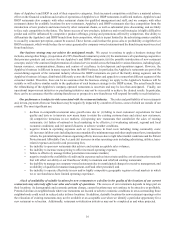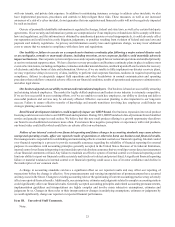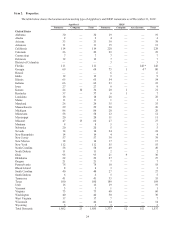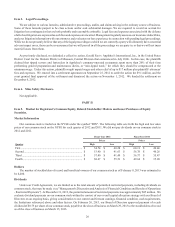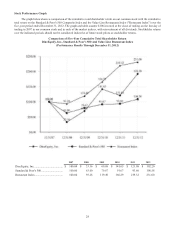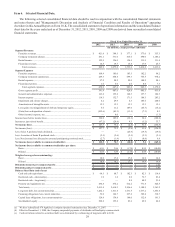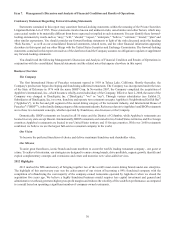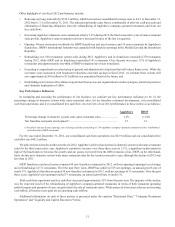IHOP 2012 Annual Report Download - page 40
Download and view the complete annual report
Please find page 40 of the 2012 IHOP annual report below. You can navigate through the pages in the report by either clicking on the pages listed below, or by using the keyword search tool below to find specific information within the annual report.22
bankruptcy proceeding by or against a franchisee would prohibit us from terminating a franchise agreement previously entered
into with a franchisee. Furthermore, a franchisee that is subject to bankruptcy proceedings may reject the franchise agreement in
which case we would be limited to a general unsecured claim against the franchisee's bankruptcy estate on account of breach-of-
contract damages arising from the rejection. Payments previously made to us by a franchisee that is subject to a bankruptcy
proceeding also may be recoverable on behalf of the franchisee as a preferential transfer under the United States Bankruptcy Code.
The number and quality of franchisees is subject to change over time, which may negatively affect our business. Our
Applebee's business is highly concentrated in a limited number of franchisees. We cannot guarantee the retention of any, including
the top performing, franchisees in the future, or that we will maintain the ability to attract, retain, and motivate sufficient numbers
of franchisees of the same caliber. The quality of existing franchisee operations may be diminished by factors beyond our control,
including franchisees' failure or inability to hire or retain qualified managers and other personnel. Training of managers and other
personnel may be inadequate. These and other such negative factors could reduce the franchisee's restaurant revenues, impact
payments under the franchise agreements and could have a material adverse effect on us. In the case of Applebee's, these negative
factors would be magnified by the limited number of existing franchisees.
The inability of franchisees to fund capital expenditures may adversely impact future growth. Our business strategy
includes the periodic updating of Applebee's and IHOP restaurant locations through new remodel programs and other operational
changes. The success of that business strategy will depend to a significant extent on the ability of the franchisees to fund the
necessary capital expenditures to aid the repositioning and re-energizing of the brand. Labor and material costs expended will
vary by geographical location and are subject to general price increases. To the extent the franchisees are not able to fund the
necessary capital expenditures, our business strategy may take longer to implement and may not be as successful as we expect.
If franchisees and other licensees do not observe the required quality and trademark usage standards, our brands may
suffer reputational damage, which could in turn adversely affect our business. We license our intellectual property to our
franchisees, product suppliers, manufacturers, distributors, advertisers and other third parties. The franchise agreements and other
license agreements require that each franchisee or other licensee use the intellectual property in accordance with established or
approved quality control guidelines. However, there can be no assurance that the franchisees or other licensees will use the
intellectual property assets in accordance with such guidelines. Franchisee and licensee noncompliance with the terms and
conditions of the governing franchise agreement or other license agreement may reduce the overall goodwill associated with our
brands. Franchisees and other licensees may refer to our intellectual property improperly in communications, resulting in the
weakening of the distinctiveness of our intellectual property. There can be no assurance that the franchisees or other licensees will
not take actions that could have a material adverse effect on the Applebee's or IHOP intellectual property.
In addition, even if the licensee product suppliers, manufacturers, distributors, or advertisers observe and maintain the quality
and integrity of the intellectual property assets in accordance with the relevant license agreement, any product manufactured by
such suppliers may be subject to regulatory sanctions and other actions by third parties which can, in turn, negatively impact the
perceived quality of our restaurants and the overall goodwill of our brands, regardless of the nature and type of product involved.
Any such actions could reduce restaurant revenues and corresponding franchise payments to us.
We are heavily dependent on information technology and any material failure of that technology could impair our ability
to efficiently operate our business. We rely heavily on information systems across our operations, including, for example, point-
of-sale processing in our restaurants, management of our supply chain, collection of cash, payment of obligations and various
other processes and procedures. Our ability to efficiently manage our business depends significantly on the reliability and capacity
of these systems. The failure of these systems to operate effectively, problems with maintenance, upgrading or transitioning to
replacement systems, fraudulent manipulation of sales reporting from our restaurants resulting in loss of sales and royalty payments,
or a breach in security of these systems could be harmful and cause delays in customer service and reduce efficiency in our
operations. Significant capital investments might be required to remediate any problems.
As part of our marketing efforts, we rely on search engine marketing and social media platforms to attract and retain guests.
These efforts may not be successful, and pose a variety of other risks, as discussed above under the heading: “A failure to develop
and implement innovative marketing and guest relationship initiatives, ineffective or improper use of social media or other
marketing initiatives, and increased advertising and marketing costs, could adversely affect our results of operations.”
The occurrence of cyber incidents, or a deficiency in our cybersecurity, could negatively impact our business by causing
a disruption to our operations, a compromise or corruption of our confidential information, and/or damage to our employee
and business relationships, all of which could subject us to loss and harm our brands. A cyber incident is considered to be any
adverse event that threatens the confidentiality, integrity, or availability of our information resources. More specifically, a cyber
incident is an intentional attack or an unintentional event that can include gaining unauthorized access to systems to disrupt
operations, corrupt data, or steal confidential information about our customers, franchisees, vendors and employees. As our reliance
on technology has increased, so have the risks posed to our systems, both internal and those we have outsourced. Our three primary
risks that could directly result from the occurrence of a cyber incident include operational interruption, damage to our relationship






